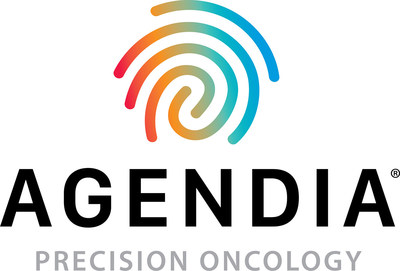Agendia, Inc., a world leader in precision oncology for breast cancer, announced new data from MINDACT, the prospective randomized trial designed to further demonstrate the clinical utility of MammaPrint® risk scoring when determining a breast cancer patient’s need for chemotherapy.
Median follow up nearing 9 years confirms MINDACT as a positive de-escalation study
IRVINE, Calif. and AMSTERDAM, May 29, 2020 /PRNewswire/ -- Agendia, Inc., a world leader in precision oncology for breast cancer, today announced new data from MINDACT, the prospective randomized trial designed to further demonstrate the clinical utility of MammaPrint® risk scoring when determining a breast cancer patient's need for chemotherapy.
At the time of reporting, the median follow up for all enrolled patients was 8.7 years. MINDACT's primary endpoint of distant metastasis free survival (DMFS) at 5 years continued to be met in chemotherapy-untreated clinically-high risk, genomically-Low Risk women with breast cancer, confirming MINDACT as a positive de-escalation study. Importantly, in this cohort, consistent with previously reported MINDACT data, these results are valid for lymph node negative as well as lymph node positive patients.
At the 5-year endpoint, with data available for 92 percent of study participants, DMFS for clinically-high risk, MammaPrint-Low Risk patients who did not receive chemotherapy was 95.1 percent. The difference in DMFS between patients in this cohort treated with and without chemotherapy narrowed from 1.5 percent, as previously reported in the New England Journal of Medicine, to 0.9 percent.
"One of the key strengths of MINDACT is that it enrolled a cohort of patients that reflects what we see in a real-world clinical setting," said Dr. Adam Brufsky, medical director of the Magee-Womens Cancer Program, part of the UPMC Hillman Cancer Center. "This increases my confidence in using MammaPrint to determine whether chemotherapy will make a difference for the patients I see in my office."
With a median follow up of 8.7 years, there was a 2.6 percent numerical difference in DMFS between clinically-high risk, genomically-Low Risk patients who were treated with chemotherapy versus those who were not. When stratifying these patients by age, investigators found that there was no difference in DMFS between women over 50 who received adjuvant chemotherapy and those who did not. In women aged 50 or younger, there was a 5 percent numerical difference in DMFS between those who did and did not receive adjuvant chemotherapy. Consistent with observations from other clinical trials, this difference, which appeared at longer follow up, can possibly be attributed to chemo-induced ovarian functional suppression.
"The MINDACT follow up data is encouraging for women of all ages who are diagnosed with breast cancer and their doctors," said Dr. Joyce O'Shaughnessy, Celebrating Women Chair in Breast Cancer Research, Baylor University Medical Center, Texas Oncology and Chair, Breast Cancer Program for the US Oncology Research Network, Dallas TX. "It is clear that if you're over 50 and clinically-high risk and genomically-Low Risk, you don't need chemo. But I don't stop to think about which bucket my patients fall into when they're in my office. The right thing to do is to get more information when it's not clear whether they will benefit from chemotherapy or not. MammaPrint tells us how a patient's disease is best treated – it allows us to know, do they need chemotherapy or not?"
By using MammaPrint to further stratify breast cancer patients according to their risk of recurrence, physicians are able to confidently determine whether chemotherapy is needed. These long-term follow up data confirm the clinical utility of MammaPrint and underscore Agendia's commitment to improving patient outcomes.
About Agendia
Agendia is a precision oncology company committed to improving clinical outcomes and informing the journey for patients with early stage breast cancer. The company currently offers two commercially available genomic profiling tests, processed through its state-of-the-art facility in Irvine, California. Agendia also provides a next generation sequencing kit for use by local laboratories outside of the United States.
MammaPrint®, the 70-gene breast cancer recurrence assay, is the first FDA-cleared risk-of-recurrence test backed by peer-reviewed, prospective outcome data and included in both national and international treatment guidelines. BluePrint®, the 80-gene molecular subtyping assay, is a commercially available test that evaluates the underlying biology of a tumor to determine what is driving its growth. Together, MammaPrint and BluePrint provide a comprehensive genomic profile to help physicians make more informed decisions in the pre- and post-operative treatment settings. By developing evidence-based, novel genomic tests, Agendia aims to support the evolving clinical needs of breast cancer patients and their physicians.
Agendia's assays can be ordered on core biopsies or surgical specimens with results provided in as little as 5-7 days to inform pre- and post-operative treatment decisions. For more information on Agendia's assays and ongoing trials, please visit www.agendia.com.
About the MINDACT Trial
MammaPrint is supported by the highest level of clinical evidence (level 1A) from MINDACT, a landmark independent trial published in the New England Journal of Medicine in 2016. MINDACT stands for Microarray In Node-Negative and 1-3 node-positive Disease may Avoid ChemoTherapy. It was a phase III, prospective, randomized, clinical study for a breast cancer recurrence test sponsored by the European Organization for Research and Treatment of Cancer (EORTC-10041/BIG3-04).
View trial information here.
![]() View original content to download multimedia:http://www.prnewswire.com/news-releases/long-term-follow-up-data-from-groundbreaking-mindact-study-continues-to-demonstrate-clinical-utility-of-mammaprint-301067657.html
View original content to download multimedia:http://www.prnewswire.com/news-releases/long-term-follow-up-data-from-groundbreaking-mindact-study-continues-to-demonstrate-clinical-utility-of-mammaprint-301067657.html
SOURCE Agendia





